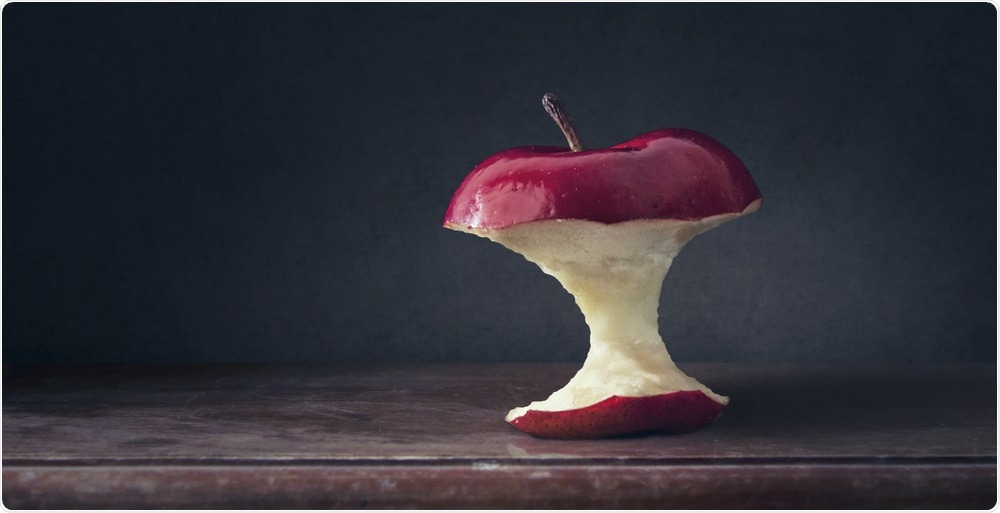“An apple a day…” says the old proverb. It would seem that everyone agrees, judging by the Number 1 position that apples hold among fruits the world over, with 83 million apples being produced every year.
A new study shows that eating an apple, core and all, is the equivalent of eating not only fiber, vitamins and, sugars, but also about 100 million bacteria. On the other hand, discarding the core cuts this down to 10 million. Eating an entire organic apple provides a variety of healthy bacteria which increase the flavor as well as providing health benefits for the body.
 garikga | Shutterstock
garikga | Shutterstock
The gut microbiota, including bacteria, viruses and fungi, are derived partly from food. Foodborne microbes colonize the gut briefly, but only if the fruit and vegetable are uncooked. This is why these foods are better consumed raw. To find out which of these help the body most, researchers analyzed the microbiota of apples.
They examined both organic and store-bought “Arlet” apples of equal freshness. The analysis was separately carried out for the stem, peel, flesh, seeds and calyx. Each of these showed a distinct bacterial profile. They then compared their findings from the two categories.
Interestingly, both organic and traditionally grown apples had the same number of bacteria, at an average of about 100 million bacteria on a 240g apple. Most of these are in the stem and the seeds of the apple core. The flesh accounts for about 10 million.
The peel contained the lowest number among all the tissues, but, along with the pulp, showed the greatest number of species. It is noteworthy that conventional apples have about half the number of seeds compared to organically grown ones.
Most of the bacteria belong to genera like Proteobacteria (80%) and Bacteroides (9%), with smaller but significant contributions from Actinobacteria and Firmicutes. Though the overall number of bacteria was similar in both categories, four out of ten types of bacterial genera showed significant variations.
The difference comes in the diversity of bacteria found in the organic apples when freshly harvested. These showed a more uniform distribution, a greater number of species, and a balanced community of bacterial species. Ingested microbes also contribute to the open bacterial ecosystem of the gut, which is connected to the bacterial species outside.
There were 50 genera found only in conventional apples and 16 genera found only in organic apples. This included groups of bacteria known to adversely affect one’s health, such as Escherichia-Shigella which causes several gastrointestinal infections.
These occur in the majority of conventionally grown apples but none of the organic apples. However, the latter showed a number of favorable Lactobacillus which were conspicuously absent from conventional apples.
Lead researcher Gabriele Berg explains, “This variety and balance would be expected to limit overgrowth of any one species, and previous studies have reported a negative correlation between human pathogen abundance and microbiome diversity of fresh produce.”
Apart from the method of growing, plant microbiomes also vary with the plant genomes, the part of the plant ingested, soil type and quality, and other biotic/abiotic factors.
Not only are these bacteria healthier, they even contribute to a better taste:
Methylobacterium, known to enhance the biosynthesis of strawberry flavor compounds, was significantly more abundant in organic apples; here especially on peel and flesh samples, which in general had a more diverse microbiota than seeds, stem or calyx.”
Gabriele Berg, Senior Author
Another study found essentially the same kind of results with respect to fungi on apples. Apple-associated fungal strains were quite specific for different tissue types and different farming philosophies.
This means that organic apples have a greater variety of healthy bacteria and fungi. However, more work is required to find out which bacterial strains are most abundant in different apple cultivars, just as different fungal species were found to be specific to different varieties.
The next step is to find the correlation between diversity in microbial intake from food and gut microbiota diversity and in turn better health outcomes.
Wasserman predicts that “The microbiome and antioxidant profiles of fresh produce may one day become standard nutritional information, displayed alongside macronutrients, vitamins and minerals to guide consumers.”
Journal reference:
Wassermann B., et al., (2019). An apple a day: which bacteria do we eat with organic and conventional apples? Frontiers in Microbiology. DOI: 10.3389/fmicb.2019.01629